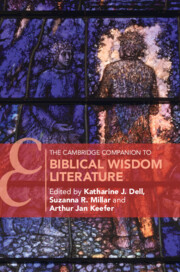
Scholars of the ancient world are, I think, often satisfied with their antique interests. They study texts and inscriptions, languages, peoples, and entire civilizations, many of which are otherwise extinct and all of which existed in ages past, and they do so with the feeling that such exploration is worthwhile. Who needs “application” when we have translation, and who wants “relevance” when we know so little about context? For the ancients, in and of themselves, have left plenty with which to be occupied. However, among the objects of study that can take a scholar out of the somewhat fantastic world of Egyptian kingship and biblical prophethood and into the rest of what life demands of them is a topic of infinite renown, genuine power, and utmost practicality. That topic is wisdom.
Wisdom is the tie that binds The Cambridge Companion to Biblical Wisdom Literature. In this volume, wisdom is treated in its biblical manifestations, mainly as an interest of the Hebrew Bible, and within several related texts and locations of the ancient Near Eastern world. Its biblical appearances reveal a skill that enables feats of architecture and leadership (Exodus; Kings), while it is, perhaps most famously, acclaimed as elusive (“where shall wisdom be found?” Job 28:12), incomparable in value (“for wisdom is better than jewels, and all that you desire cannot compare with her” Prov 8:11), and inexhaustible in supply (“Get wisdom, and whatever you get, get insight” Prov 4:7). Such is the grandeur of biblical wisdom. And yet it is the task of this Companion to account not only for that grandeur but also for wisdom’s textual dependencies and multi-cultural upbringing. For wisdom took shape through multiple literary genres and owes a great deal to ancient scribes. It has close ties to God and figures like King Solomon, while several biblical books have something distinctive to contribute to its holistic shape, be that Proverbs, Job, Ecclesiastes, the Song of Songs, or Psalms. Wisdom has more debated relations with several themes of the Hebrew Bible, including creation, reward, retribution, pedagogy, and virtue, all of which come with their fair share of scholarly discussion.
Wisdom, however, is not only a biblical matter. It also receives a wide-ranging representation in other literature and cultures of the ancient Mediterranean. It appears throughout several eras of Egyptian history as, among other things, an object and means of professional training. It arises within a wider variety of genres in Mesopotamia and Syro-Palestine, having a similar interpretive relationship to the themes mentioned above, such as reward and virtue. Wisdom then takes on a renewed vigor in the time spanning the Hebrew Bible and New Testament with texts like The Book of Wisdom and Ben Sira. And yet, while wisdom does indeed move across an impressive, shared expanse, and does indeed have common features amidst many pieces of literature, this is not to construe it as a monolith. As the contributions to this volume make clear, wisdom has a texture that is not always even and a richness that defies simplification. What else would one expect from something that served as an aid to life for so many different people in so many different ages? Such is the privilege of wisdom.
Such also is the privilege of those who study it: to decipher cuneiform, consult the severed yet stunning images engraved upon ancient walls, to read time and time again material that has become canonical for communities past and present, and to formulate the differences between one ancient society and another. But no matter how much one attends to those tasks, biblical or otherwise, the concern with wisdom strikes one as ageless and takes us to the question that produced so much of its literature: how ought life be lived? Wisdom, thought some, was suitable for the job.

Latest Comments
Have your say!